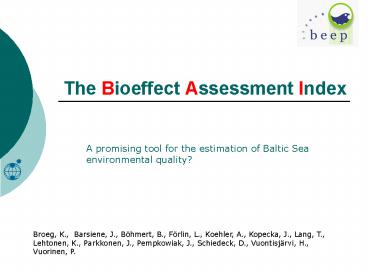The Bioeffect Assessment Index PowerPoint PPT Presentation
1 / 39
Title: The Bioeffect Assessment Index
1
The Bioeffect Assessment Index
A promising tool for the estimation of Baltic Sea
environmental quality?
Broeg, K., Barsiene, J., Böhmert, B., Förlin,
L., Koehler, A., Kopecka, J., Lang, T., Lehtonen,
K., Parkkonen, J., Pempkowiak, J., Schiedeck, D.,
Vuontisjärvi, H., Vuorinen, P.
2
Aim of the study
- A concept for the application of a biomarker set
in pollution monitoring
3
Aim of the study
- A concept for the application of a biomarker set
in pollution monitoring - Quantification of pollution-induced alterations
of the biological system
4
Aim of the study
- A concept for the application of a biomarker set
in pollution monitoring - Quantification of pollution-induced alterations
of the biological system - Individual Fish Health Ecosystem Health
5
Strategy
- Biomarkers of toxic effects and exposure at
different levels of biological organisation were
selected - These markers were applied on each individual
fish to define a physiological status of
pollution-induced alterations
6
Biomarker cascade
Molecular EROD
Subcellular Lysosomal Stability
membrane
Cellular Liver Cell Lipid
Accumulation
Individual Macrophage Aggregate
Activity Trichodina Infection
Intensity
Community Parasite Diversity
7
Scale of Biomarker Responses
- Is a progress of alterations detectable?
8
Scale of Biomarker Responses
Stage 1 Lystab gt20 min.
Stage 2 Lystab gt10- 20 min.
Stage 3 Lystab 5-10 min.
Stage 4 Lystab lt 5 min.
EROD not induced no lipid accumulation active
immune response low Trichodina infection high
parasite diversity
EROD induction lipid accumulation immune
response Trichodina infection parasite diversity
EROD induction lipid accumulation immune
response Trichodina infection parasite diversity
EROD induction lipid accumulation immune
response Trichodina infection parasite diversity
Medium/late response
Early response
Late response
No response
High variability
Chronic contaminant exposure
9
Integrated evaluation of BEEP data
- The following examples are based on data from
biomarker studies in the Baltic Sea (2001-2002,
EU project BEEP) - Biomarkers were studied in more than 600
individual flounder
10
- How can we integrate this complex biomarker
information into a general index for the
quantification of biological effects?
11
BAI - Bioeffect Assessment Index
- Based on Health Assessment Index (Adams et al.
1993) - allows statistical comparison among sample data
and integration of different parameters. - Substitution of each parameter value according
to grading by a numerical value - stage 110, stage 220, stage330, stage 440
12
BAI - Bioeffect Assessment Index
- calculation by summing all individual fish BAI
values and dividing by the total number of fish
in the sample - higher BAI values indicate poorer health
condition
13
BAI - Bioeffect Assessment Index
- The BAI is created as a screening index
reflecting the complex contamination situation of
coastal areas - The BAI includes biomarkers of non-specific
toxic effects, exclusively - In a second step biomarkers of specific exposure
may help to identify the quality of contamination
14
BAI - Bioeffect Assessment Index
- Parameter included
- Lysosomal membrane stability
- Neutral lipid accumulation
- Activity of macrophage aggregates
15
BAI - Bioeffect Assessment Index
16
Quantity
17
Quality
18
(No Transcript)
19
(No Transcript)
20
BAI
EROD
21
Metallothionein
22
Metallothionein
23
Metallothionein
24
Metallothionein
25
(No Transcript)
26
(No Transcript)
27
(No Transcript)
28
BAI (2) - Bioeffect Assessment Index
- Parameter included
- Lysosomal membrane stability
- Neutral lipid accumulation
- Activity of macrophage aggregates
- Micronuclei
29
BAI (2) - Bioeffect Assessment Index
30
BAI
LOC 1
LOC 5
LOC 3 2002
LOC 4 2002
BAI (2)
31
Conclusions
- The application of the BAI in Baltic Sea flounder
yielded - consistent results for the assessment of
biological effects caused by the complex and
diverse contamination situation at the different
sampling locations. - It may serve as a promising quantitative tool for
the assessment of biological effects in
monitoring programmes.
32
Conclusions
- Index values were comparable to calculations
obtained from biomarker studies on flounder of
the German Bight.
33
Conclusions
- Additional application of specific biomarkers/
biomarkers of specific exposure provided
indications of the quality of contamination.
34
What next?
- Discussions for the further improvement of this
concept to deliver a scientific-based instrument
for the assessment and quantification of
environmental quality in German Bight and Baltic
Sea
35
Thanks
- European Union (EU) Project BEEP, WP 2.
- Babette Peschel, Sonja Einsporn, Wiebke Kaiser,
Dr. Markus Salomon. - Hans-Carl Lührs and his crew (research vessel
Uthörn). - All the people who worked for this project in all
WP2 laboratories.
36
- In an ecosystem all ecological processes are
interrelated so that a significant disturbance
affecting only one process will impigne on the
whole. - Norton, 1991
37
Scale of Biomarker Responses
EROD
Neutral lipid accumulation
Absorbance
Activity
Stages
Stages
Trichodina infection intensity
Acid phosphatase activity in MA
Intensity
Absorbance
Stages
Stages
Number of different parasite species
Number
Stages
38
Biomarker Gradation
Numerical values (BAI) assigned for the applied
biomarkers (North Sea flounder).
39
BAI - Bioeffect Assessment Index

